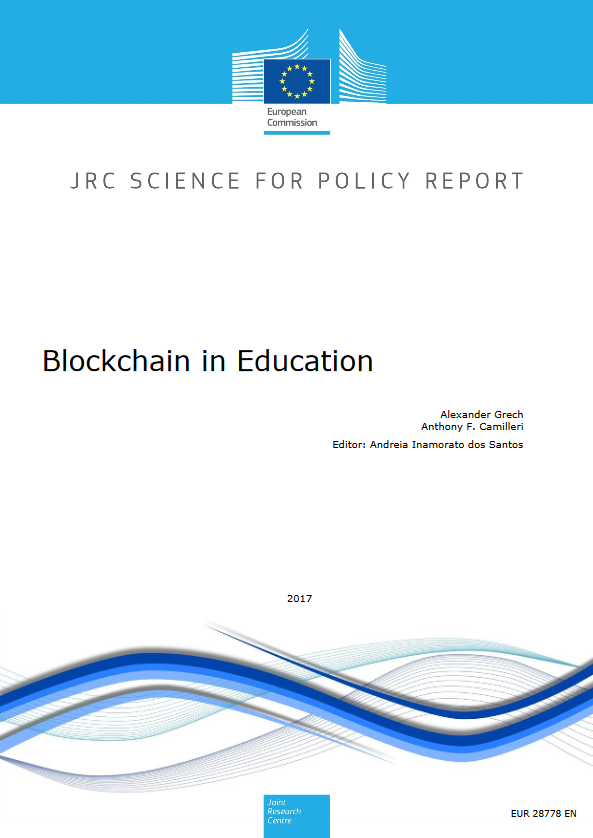„Blockchain is not a solution to everything“ Interview with Anthony F. Camilleri
„Blockchain is not a solution to everything“ Interview with Anthony F. Camilleri
13.03.18
Im Herbst 2017 erschien die Studie „Blockchain in Education“, in der Alexander Grech und Anthony F. Camilleri Potentiale und Szenarien für den Einsatz der Blockchaintechnologie im Bildungsbereich aufzeigen und Empfehlungen formulieren. Das Interesse an dem Thema ist groß, wie man anhand zahlreicher Initiativen, Start-ups und Veranstaltungen feststellen kann. Im Interview berichtet Anthony F. Camilleri vom Entstehungsprozess und den Rückmeldungen auf die Studie, sowie der Aufgabe des Staates für die Entwicklung von Blockchain. Anthony arbeitet für das Knowledge Innovation Center und twittert unter @anthonyfc.
Wir haben Athony Camilleri schriftlich sowie im Video interviewt – es handelt sich übrigens um verschiedene Interviews, es lohnen sich also beide!
HFD: What gave you and Alexander Grech the initial spark to start working on the study?

How long did you work on it?
Initially we were planning to do a quick six week research report which at the time we thought would just be looking at certification in education. As a matter of fact, Blockchain has turned out to be significantly more work than that because there had just been new initiatives starting practically on a weekly basis. So our six week study actually turned in to a six month 140-page study. In the middle of September 2017, we needed to lock the study and just reported everything what was happening up until that point.
To introduce our readers into the topic: can you sum up in a few words what the study is about and who should read it?
Maybe I better start with what the study is not about. There had been a lot of news lately about Bitcoin, about cryptocurrencies, about stock market speculation. The study is not about any of these things. It is about the underlying technology that is behind these cryptocurrencies, which is something called Blockchain and which has significant implications on databases’ distributed ledgers. A ledger is simply a database that records transactions: the transfers of assets from one person to the other. Blockchain will revolutionise any database that is structured as a ledger.
For education, that means transactions of intellectual property, transactions of certificates, transactions involving tuition fees and many other different types of transactions.
Whoever is involved with managing databases in education – I would imagine these are mainly registration offices, knowledge transfer offices, libraries, intellectual property offices – would find something of interest for them in the study.
Why should Higher Education Institutions (HEI) think about dealing with Blockchain?
![Blockchain is more beneficial for users. Photo: [https://unsplash.com/photos/3aVlWP-7bg8 Mikael Kristenson]](/sites/default/files/images/blog/mikael-kristenson-242070-unsplash.jpg) To understand why they should deal with Blockchain, we need to understand what the problems are with today’s databases. Quite simply: when you put things in a digital database, there is an implicit social contract whereby you get something digital, but with the price of losing the permanence of that record and of having certain security and privacy risks. You need to trust the organisation that is storing those records. The main advantage of Blockchain is that it changes these things. Blockchain is said to be unhackable, the records are undeletable and it removes the need of this central authority which you would need to trust and handle these records. By doing that, Blockchain changes the entire governance structure of the databases, as well as changing this social contract to be more beneficial to the user. These are significant advantages both for the organisations and the users that are actually doing these transactions. For a user this also means that they have control over their own data.
To understand why they should deal with Blockchain, we need to understand what the problems are with today’s databases. Quite simply: when you put things in a digital database, there is an implicit social contract whereby you get something digital, but with the price of losing the permanence of that record and of having certain security and privacy risks. You need to trust the organisation that is storing those records. The main advantage of Blockchain is that it changes these things. Blockchain is said to be unhackable, the records are undeletable and it removes the need of this central authority which you would need to trust and handle these records. By doing that, Blockchain changes the entire governance structure of the databases, as well as changing this social contract to be more beneficial to the user. These are significant advantages both for the organisations and the users that are actually doing these transactions. For a user this also means that they have control over their own data.
Do you think that students and organisations are aware of their self-sovereignty and the following responsibility for their data?
I think this is a two-part question. First of all, I will unpack this concept of self-sovereignty.
Self-sovereignty means that you get the same rights for the digital document as you would have with a paper document. For example, if I give you a diploma certificate, you will store that in your safe at home and you control access simply by handing another person the certificate. No public organisation has access to your certificate unless you decide to. Self-sovereignty is effectively enabling the same thing with a digital certificate.
In terms of “Are people ready for this?”, I would like to talk about this changing social contract. People need to understand that thanks to Blockchain it will be possible to actually store your own secure digital records without giving them to these master databases and without sharing them unless you want to. The second part, of course, is how to do that. Now again, if we take the comparison with paper – paper records can of course be destroyed very easily. But for those paper records, people tend to store them in a safe place at home and most people are quite good at keeping their paper records for decades with very simple precautions. There’s no difference in the digital world. If you have stored those digital certificates – be it on your phone, your laptop or on a secure external drive, with some very simple back-up procedures, as simple as copying it to a paper or storing it on a USB stick, it’s very simple to keep things.
Let’s go on with the implications for the European Higher Education Area. One of your recommendations was to amplify collaboration, e.g. in terms of standardisation. What else does Blockchain technology mean for collaboration between member states?
![]() In terms of collaboration, standardisation is very important. You can store any type of ledger entry into a database, but if everybody is launching their own custom database and storing their data in their own way, then you get multiple either poly-interoperable or non-interoperable databases and you lose the value proposition. The other part is that technically, Blockchain gives you the ability that every member in the network can participate and govern the database equally but it still requires everybody to sign up to the same database and to the same standard. If we are going to create these sorts of systems, a big part of it – which is non-technological – is just the networking aspect and organisations coming together to work in the databases together.
In terms of collaboration, standardisation is very important. You can store any type of ledger entry into a database, but if everybody is launching their own custom database and storing their data in their own way, then you get multiple either poly-interoperable or non-interoperable databases and you lose the value proposition. The other part is that technically, Blockchain gives you the ability that every member in the network can participate and govern the database equally but it still requires everybody to sign up to the same database and to the same standard. If we are going to create these sorts of systems, a big part of it – which is non-technological – is just the networking aspect and organisations coming together to work in the databases together.
On the one hand Blockchain offers a lot of advantages for users, but on the other hand, companies may see it as a risk for their business model. Are they interested in the development of the technology?
![A chain of blocks, not to be confused with a blockchain. Photo: [https://unsplash.com/photos/Xz7MMD5tZwA Ryan Fields] A chain of blocks](/sites/default/files/images/blog/ryan-fields-328391-unsplash.jpg) Well, like every innovative technology, it causes disruption. This would significantly disrupt the business model of any company that has a technology based on ledgers. Different companies are responding in different ways. Blockchain exists, so all of them are very quickly investing in Blockchain startups.
Well, like every innovative technology, it causes disruption. This would significantly disrupt the business model of any company that has a technology based on ledgers. Different companies are responding in different ways. Blockchain exists, so all of them are very quickly investing in Blockchain startups.
Some companies are taking an open approach to Blockchain which essentially means open standards and interoperability, but unfortunately what many more companies are doing is that they are introducing partial implementations of Blockchain. It means that they will implement the features that allow for the ledger not to be hacked, but they don’t necessarily implement the features of decentralisation, so they maintain the dependency on their company. Another way they could choose is to store the very basic information on a Blockchain. If we are talking about an educational certificate, for example they would store on the Blockchain the information that I have transferred certificate number 54328 to you, but then storing what the serial number means on their own servers using a proprietary algorithm again.
We are seeing a big explosion in these partial implementations of Blockchain. As Blockchain is a very technical topic, it’s hard for a normal user – and even for an expert – to actually find out if a particular Blockchain implementation is open or not. Therefore one of the big recommendations of our study is that governments adopt what we call an open Blockchain standard: that they only work with vendors that are using solutions that are interoperable, vendor-independent and based on common standards.
So you think that governments have the power to set different conditions when working with private partners?
This is a very tricky question because on the one hand there is clearly a need for regulation. On the other hand, Blockchain is still in extremely early stages, we are just beginning to understand the potential of this technology and you wouldn’t want to necessarily do anything that constrains innovation. In terms of Blockchain in Education, I would say that we do need an element of governmental regulation, but in this case it’s actually required to open – to promote open standards and interoperability. I think it’s the role of the government to say: “Listen, anyone who works with us has to follow certain criteria.”![It's the role of government to say: "Listen, anyone who works with us has to follow certain criteria." Photo: [https://unsplash.com/photos/ECXB0YAZ_zU Jennifer Burk]](/sites/default/files/images/blog/jennifer-burk-118076-unsplash.jpg)
On a European level: who should take the initiative to work with private partners?
This is actually a multi-part question. At the highest level, there is a need for general standards or for open Blockchain implementations as a whole. That is most easily implemented at the governmental level. However, the beauty of Blockchain is that specific implementations can be run by the networks that need them. For example, if we are creating a Blockchain to trade ECTS, that could actually be build and run by universities. As Blockchain is such a technical subject, I would argue that there is a need for a repository of good practice and some sort of authority at governmental level that can say: “These are the right ways to implement Blockchain” and “These are the wrong ways”.
Can Blockchain also be an instrument to promote Open Education?
I would believe so. I believe very much in open standards and in Open Education. If you think of Open Education as a concept that allows you to study anytime, anywhere, take your qualifications from one institution to another and have them understood and translated, using open available materials, Blockchain can help with a few of these things. But the technology alone won’t change anything without the standards on how to use the technology.
To end our interview – is there a topic you would like to highlight from your side?
Well, I want universities to take a well-informed decision before implementing Blockchain. Rather than trying to just convert existing processes to Blockchain, it works better the other way round. When experimenting with Blockchain, they should query themselves: “How do I transact with organisations, what transactions from other organisations do I need to recognise, what is the community that actually does these transactions?” And if I have a community doing this, then maybe I have the potential for a Blockchain implementation. Not to work with other institutions or not to try to create a networking standard would destroy most of the advantages in Blockchain. It is also important to point out that Blockchain is not a solution for everything. It is something with a very specific usage case.



 Channa van der Brug
Channa van der Brug 